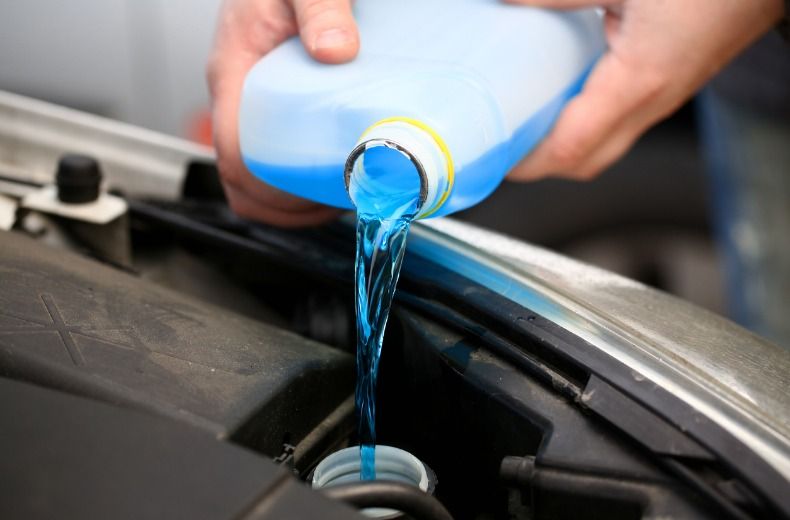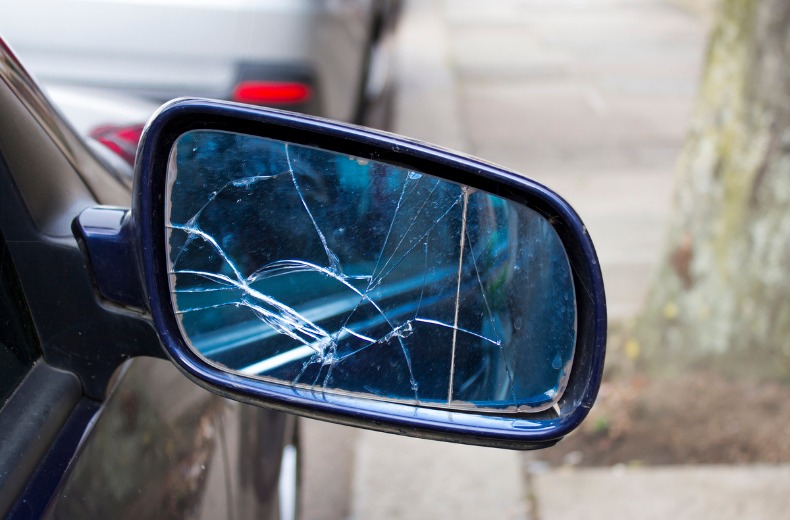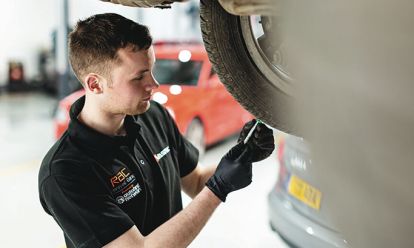The good news is that penalties and points on your licence can be avoided by making regular yet simple maintenance checks.
Here, we look at some of the problems that might arise when you haven’t given your car the attention it deserves and how to prevent them from affecting your bank balance.
Replacing worn tyres
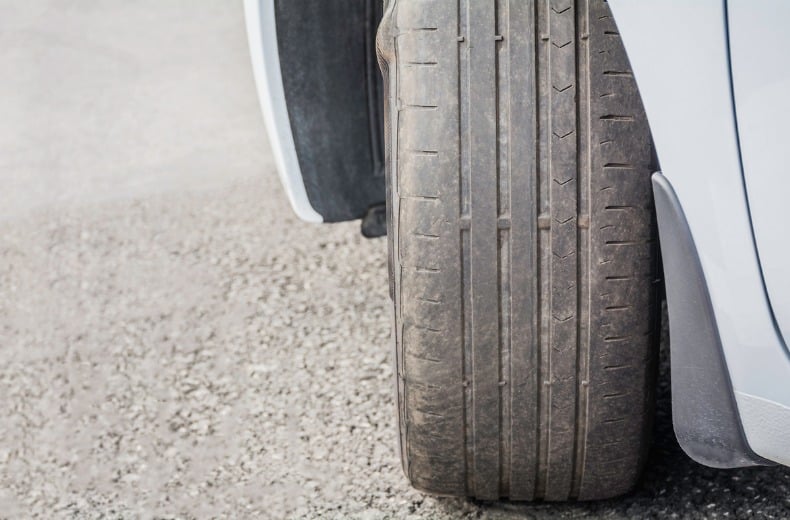
Fine: £2,500 (per tyre), potentially £10,000 in total
Penalty points: 3 (per tyre), potentially 12 in total – 6-month disqualification for repeat offences within 3 years
According to the Highway Code, the minimum tread depth for cars is 1.6 millimetres around the circumference of the tyre and through the central three quarters of tread width.
If you’re having trouble measuring tread depth, you can use the 20p test. Simply insert a 20 pence piece into a groove in your tread and if you can’t see the outer band on the coin, your tyre is above the legal limit.
Strictly speaking, you could be punished per worn tyre but if you keep an eye on your tread things shouldn’t end up so expensive. Whatever you do, make sure you don’t start a journey with tyres like this risk taker in Scotland.
For more help checking your tyre tread depth and a handy video explainer, you can visit our tyre tread depth and tyre safety checks page.
How to fix the problem
There’s only one way to fix a worn tyre and that’s to replace it. Second-hand tyres are fine if they meet the minimum tread depth and other legal requirements.
If you’re unsure about what to check for, take a look at our tyre buying guide.

Cheaper than AA or we’ll beat by 20%^
• Roadside cover from £5.49 a month*
• We get to most breakdowns in 60 mins or less
• Our patrols fix 4/5 breakdowns on the spot

Inflating or deflating tyres to the correct pressure

Fine: £2,500 (per tyre), potentially £10,000 in total
Penalty points: 3 (per tyre), potentially 12 in total – 6-month disqualification for repeat offences within 3 years
Your tyres will be deemed illegal if they’re under or over inflated, and with good reason too.
Under inflated tyres are less responsive to changes in direction, which can prove dangerous when turning, especially at higher speeds. Over inflated tyres have less grip on the road, making it more difficult to slow down when applying the brakes.
In some cases, too much air in your tyres could lead to a blowout. A sudden rupture can happen without warning and make steering your car incredibly difficult. Remember, blowouts don’t always happen while inflating a tyre, they can strike suddenly because of overloading or aged tyres.
It's also important to look out for slow punctures. Even if you’re in the habit of inflating your tyres regularly, a slow puncture could see pressure levels fall below legal limits.
How to fix the problem
Fixing your tyre pressure is one of the most straightforward maintenance tasks of them all. You can check your pressure at most petrol stations and inflate or deflate your tyre according to your vehicle handbook.
For more information on how to inflate or deflate your tyres or what to look out for to find a slow puncture, read our checking your tyre pressure page.
- Tyre safety – all you need to know
- Top tips on getting more miles from your tyres
- Should I buy winter tyres? Pros, cons and costs explained
Replacing blunt or broken windscreen wipers
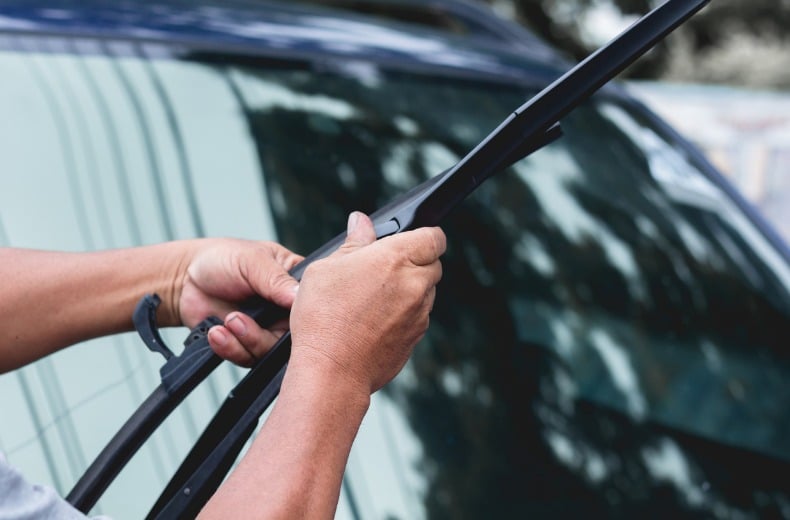
Fine: £2,500
Penalty points: 3 penalty points – 6-month disqualification for repeat offences within 3 years
The Department for Transport (DfT) explains that all windscreen wipers ‘must be properly adjusted and maintained in efficient working order’. Failure to do so could impair your view of the road and lead to dangerous driving scenarios.
It may seem like a minor inconvenience to some but if your wipers aren’t clearing your windscreen properly, you could be charged with ‘using a vehicle in a dangerous condition’. The serious offence comes with a £2,500 fine and 3 penalty points. If you’re found to commit the offence (or one similar) twice within 3 years, you may be disqualified from driving for a minimum of 6 months.
How to fix the problem
The best way to avoid a fine for faulty windscreen wipers is to replace them. You can find out how to check and replace your windscreen wipers with the help of RAC Patrol Ben Aldous.
Our handy wiper blade finder lets you enter your reg or car’s make and model to find and buy the right blades for your vehicle.
Do you need windscreen repair?
Topping up washer fluid
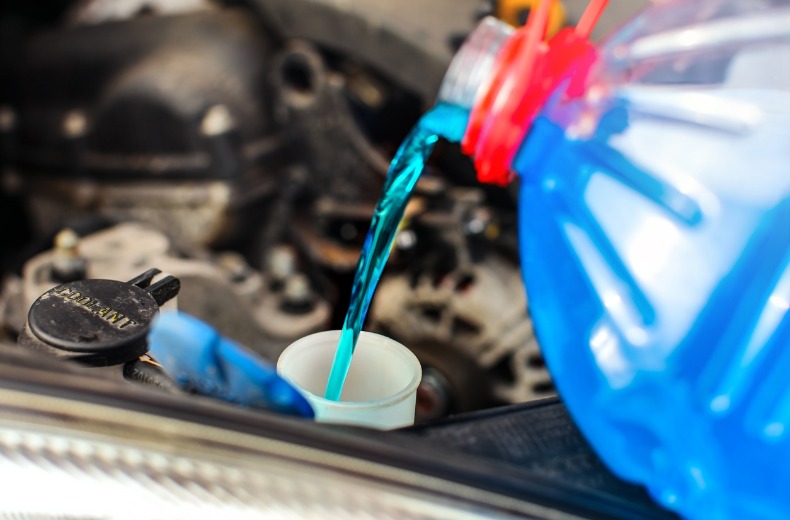
Fine: £100
Penalty points: 3 points
Section 34 of the Road Vehicles Regulations 1986 says that cars must be fitted with a windscreen wiper and washer capable of cleaning your windscreen at all times.
The rule ensures that drivers have a clear view of the road to minimise the chances of road traffic accidents. If your car has no washer fluid, you could be charged with careless driving, an offence where police have the power to issue an on-the-spot fixed penalty notice for £100 and 3 penalty points.
How to fix the problem
This one’s easy, simply pop your bonnet, find the washer reservoir, and unscrew the cap to top up the fluid levels. You can buy screen wash ready-mixed, or you may have to dilute the liquid according to instructions on the packaging.
Find out more about how to check your windscreen wash.
Replacing a broken or missing registration plate

Fine: £1,000
If you’re driving around with a cracked number plate, or one covered by mud or snow, you could be hit with a £1,000 fine by the police. The same applies if you’re towing a caravan or trailer without an extra number plate fixed on the back or sides.
How to fix the problem
If there’s mud, snow or ice obstructing the view of your number plate, simply clean it away. While you’re at it, you might want to wash the rest of your car too, our guide on how to wash a car twice as well in half the time can help.
Alternatively, if your registration plate is missing or damaged, or you plan on towing a vehicle, you’ll need to buy a new plate. If you can’t fix a registration plate on the back of your trailer, fix it to both sides instead.
It could be a good opportunity to buy a personalised number plate, but make sure you get yours from a registered number plate supplier.
Car playing up?
Get quality repairs at a fair price, plus a 12 month warranty with RAC Approved Garages.


Replacing a broken wing mirror
Fine: £2,500
Penalty points: 3 penalty points – 6-month disqualification for repeat offences within 3 years
Wing mirrors play an important role in keeping us safe. They allow drivers to see other road users behind them without having to turn their heads, but it’s their position at the side of cars that makes them vulnerable to damage.
As RAC road safety spokesperson Simon Williams says: “Broken wing mirrors are sadly far too common a sight on our roads.
"With the Highway Code due to change in 2022 to give cyclists travelling straight ahead priority over drivers turning at junctions, it will be more important than ever to have undamaged wing mirrors.”
A police officer may decide that driving with a broken wing mirror counts as ‘using a vehicle in a dangerous condition’. The offence comes with a £2,500 fine and 3 penalty points will be added to your licence.
How to fix the problem
Sometimes a loose wing mirror can be popped back into place. For more substantial damage, it’s best to take your car to a professional. An RAC Approved Garage or RAC Mobile Mechanic will be happy to help with repairs.
Repairing or replacing windscreen chips
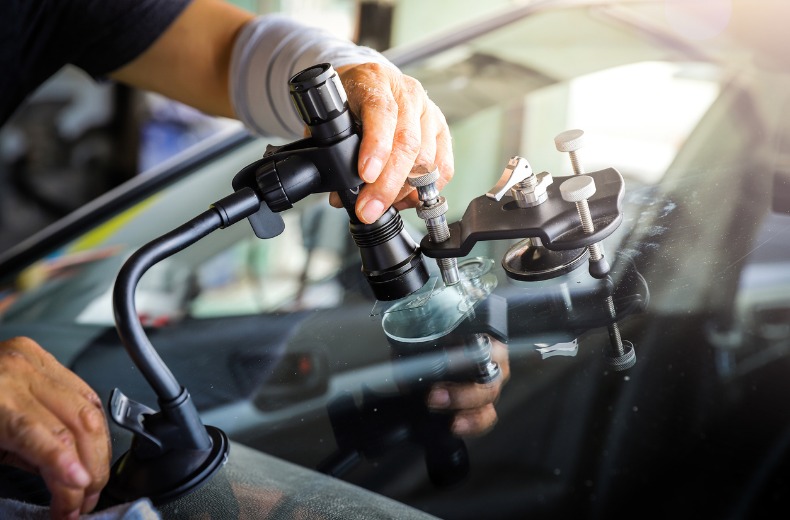
Fine: £2,500
Penalty points: 3 penalty points – 6-month disqualification for repeat offences within 3 years
Damaged windscreens can have a serious impact on your safety. Minor scratches and small chips can lead to dazzle and glare that impairs your view of the road and if left ignored, the damage can spread.
The Highway Code says that drivers should have a full view of the road ahead and glass should be maintained in a good condition. The rules divide windscreens into a Zone A and Zone B, which you can see below. Damage of 40mm in size anywhere on the windscreen will lead to an MOT fail, while 10mm of damage in Zone A will also lead to an MOT fail.
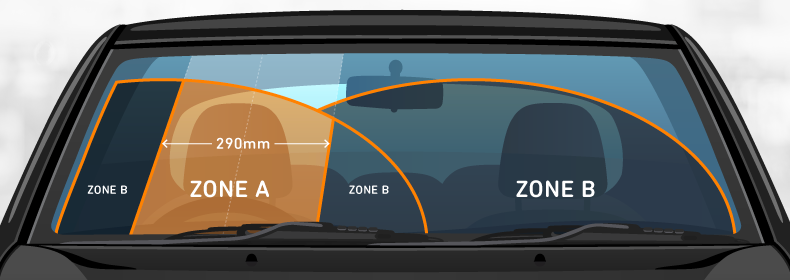
If a police officer decides you’re using a vehicle in dangerous condition, you could face a £2,500 fine and 3 points on your licence. If you end up in an accident while driving with a cracked windscreen, you may be liable and charged with a more serious offence.
How to fix the problem
The quicker you act the better. An epoxy or acrylic adhesive can be used to fill small chips for a relatively cheap price, whereas larger signs of damage will require a replacement windscreen.
The best approach is to seek the help if you do need a repair from an RAC Approved Garage as soon as possible. Read our guide for more advice on how to deal with damaged windscreens.
Clearing out rubbish
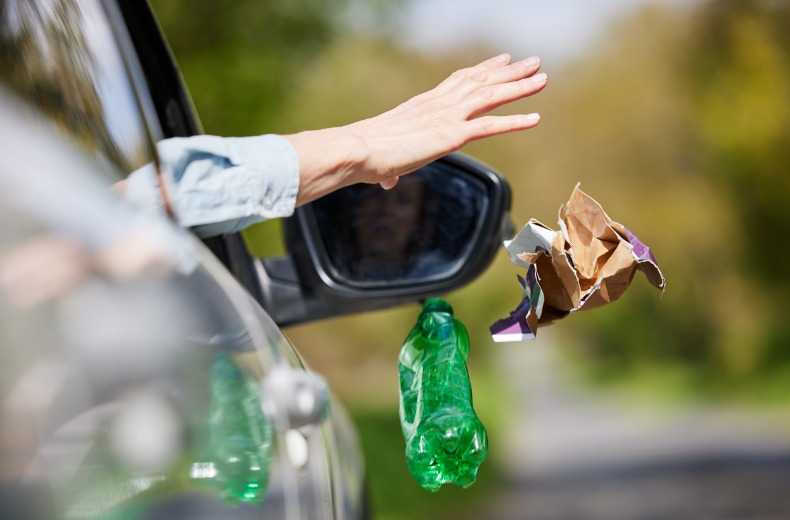
Fine: £150
Not all motorists take the steps they need to make their car last longer. Some car interiors can become temporary homes to old coffee cups, takeaway bags, and anything else you might discard on your travels.
Apart from being unsightly, the rubbish could see you slapped with a fine when you open a door. If you’re deemed to have littered from your car as items fall from your footwell or door pocket for example, you could be hit with a £150 fine.
Rubbish-filled interiors can be a hazard too, as items in the footwell or near the windscreen can affect your ability to drive safely. A problem that was brought to light by a lorry driver who failed to see a cyclist from behind his cluttered dashboard.
How to fix the problem
Grab a black bag and get to work. By using a microfibre cloth to remove dirt and crumbs from floor mats and protective sprays on dashboard plastics you can reduce the likelihood of cracking or discolouration to your interior too.
Replacing lightbulbs
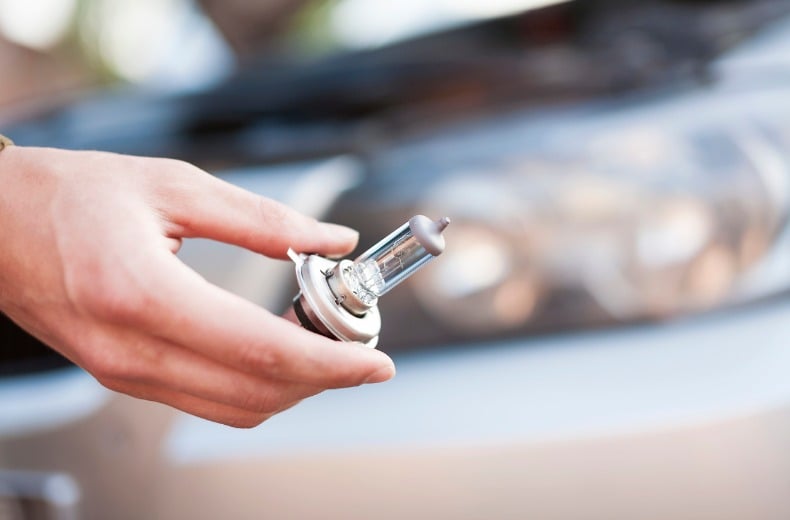
Fine: £100
Penalty points: 3
Lightbulbs in headlights, brake lights and any other part of your car can blow at any time. Most frustrating of all, drivers can be completely unaware of the faulty bulbs until they’re pulled over by the police.
You should check your lights and bulbs regularly and ask somebody to help. You’ll need to run through a sequence that covers all your lights and should replace any that aren’t working properly.
The police can give you a £100 fine and 3 penalty points on your licence – they may also issue a ‘vehicle defect rectification notice’, giving you 14 days to show that you’ve fixed the problem. If you’re in an accident while driving with defective lights, you could be blamed for the incident and given a much more serious charge.
How to fix the problem
Replacing bulbs may sound straightforward but it can be tricky to find the right bulbs for the job, and disconnecting bulbs may prove tricky too. If you find a faulty bulb and you’re unsure about how to replace it, you can always contact an RAC Approved Garage and ask if they offer a bulb fitting service.
If any of your lights are obscured by dirt, you’ll need to clean them. Our headlight restoration guide can even help make your lights appear brighter.
Checking exhaust emissions
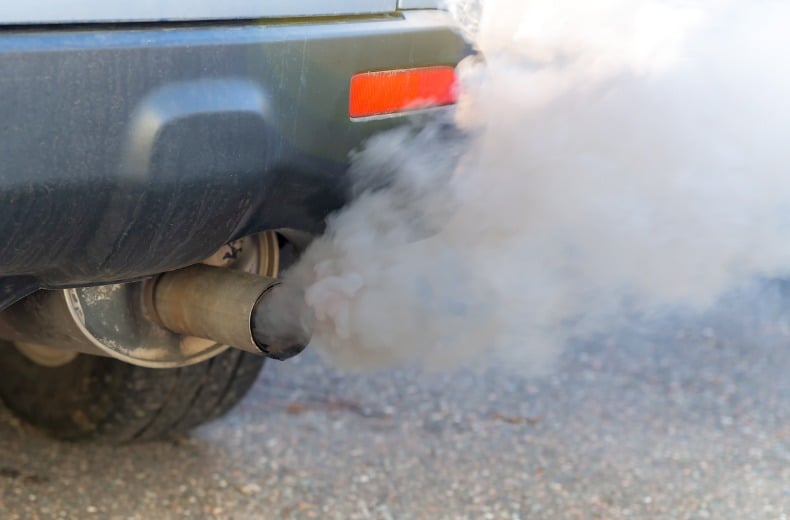
Fine: £1,000
Every year, around 40,000 deaths in the UK are attributed to poor air quality. It’s no wonder that the ban on the sale of new petrol and diesel cars is a hotly debated topic.
Even if you haven’t bought an electric car, as the owner of a conventional combustion engine vehicle, you can still play your part to keep pollution levels low. If you don’t, your car may be deemed unroadworthy and fail an MOT.
There are a few tell-tale signs to look for to find out if your car is giving off more harmful emissions than it should:
- a change in vehicle noise, a rattle underneath your car or a pungent smell of fumes could suggest a problem with your catalytic converter
- excessive or dark smoke leaving the exhaust - our guide to engine smoke can help identify the problem
- diesel particulate filter warning lights turning on
Driving a car that doesn’t comply with the air pollutant emissions standards it was designed to meet carries a £1,000 fine.
How to fix the problem
You might be able to fix a faulty diesel particulate filter by going on a long drive. If the warning light remains on and the problem persists, you’ll need the help of a mechanic.
Similarly, if you hear strange noises or notice unusual smoke leaving your exhaust, you should contact a professional. An RAC Approved Garage is a great place to start.
- Why is my car making that noise? A guide to unusual vehicle sounds
- Euro 1 to Euro 6 guide - find out your vehicle’s emissions standard
- Car dashboard symbols and meanings – warning lights guide
- Exhaust repairs
Clearing snow- or mist-covered windscreens

Fine: £2,500
Penalty points: 3 penalty points – 6-month disqualification for repeat offences within 3 years
The police regularly pull over motorists who decide to hit the road without clearing their windscreen. Some cases are far more extreme than others, like the driver from Dundee who was pulled over in 2021 with almost their entire car covered in a thick layer of snow.
Rule 229 of the Highway Code explains that ‘you MUST be able to see, so clear all snow and ice from all your windows’. You should even remove all snow that might fall off your car into the path of other road users.
If you’re judged to be ‘using a vehicle in a dangerous condition’ you can be fined £2,500 and issued 3 penalty points.
How to fix the problem
Some drivers might be tempted to try windscreen clearing ‘hacks’ as seen on TikTok but the hot water shortcut isn’t worth the risk. It’s always best to demist your windscreen properly instead.
If demisting your window is a recurring issue you might want to consider air-con regassing.
These fines often change and are correct as of Feb 2022.
Get 30 driving tips that will save you money
Running a car isn’t cheap, but there are some easy things you can do to keep your costs down. Get these tips and more useful driving articles sent straight to your inbox now.



